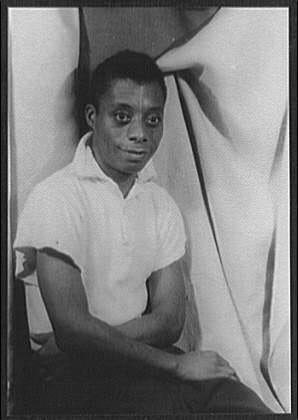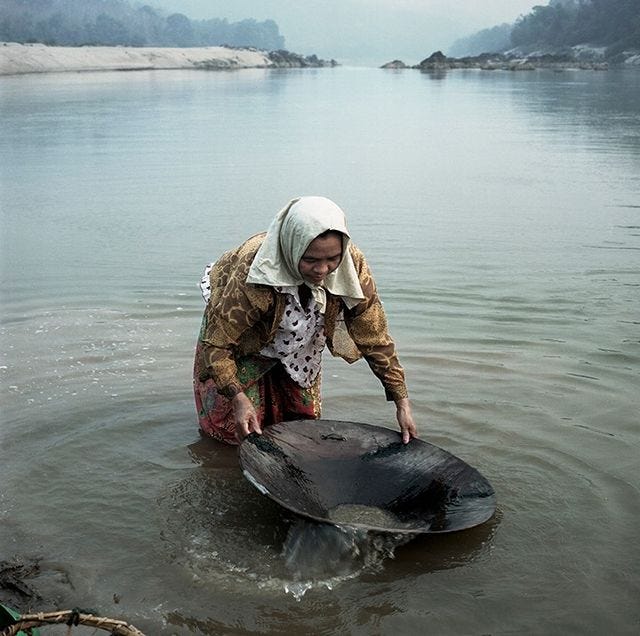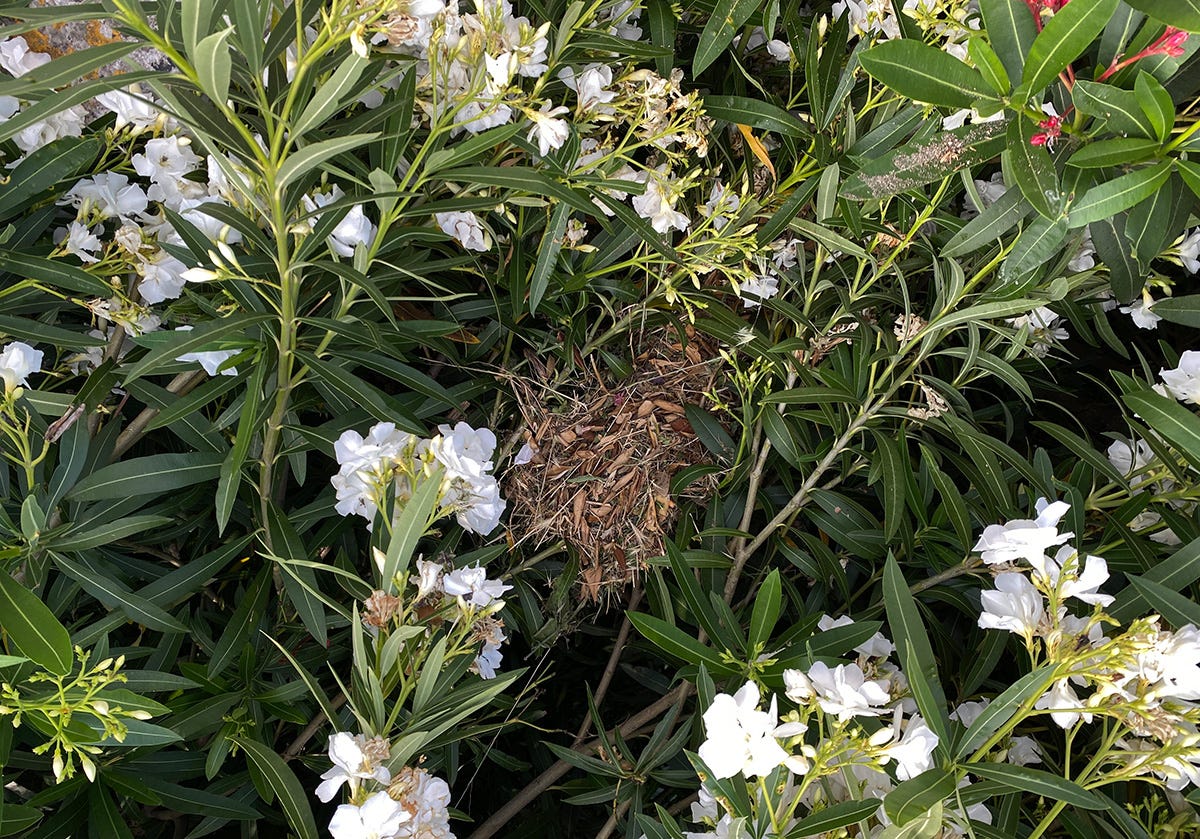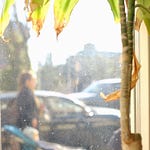There is a loneliness that can be rocked. Arms crossed, knees drawn up, holding, holding on, this motion, unlike a ship’s, smooths and contains the rocker. It’s an inside kind—wrapped tight like skin. Then there is the loneliness that roams. No rocking can hold it down. It is alive. On its own. A dry and spreading thing that makes the sound of one’s own feet going seem to come from a far-off place.
—Toni Morrison, Beloved
On place and identity & how we navigate the world
Sweet Bitter Blues by Amanda Petrusich, on the journey she sets out on (self-consciously battling reductive distillations, not helped by the fact that she didn’t speak Japanese) to find out why the American Blues holds a special place in the heart of some Japanese. What resonates with me are her tentative explorations, which remind me of my own in unfamiliar countries—testing our existing ideas against what we see before us, hoping we’ll get some measure of things right.
I was curious, though, about how this particular transmigration might be more complicated; blues, after all, is especially indebted to its place of provenance (the Deep South—specifically northwestern Mississippi and parts of Arkansas, Louisiana, and Texas). To my ears, it is the most essentially American of all the great American idioms, and contains a more literal retelling of its originating landscape than any other genre I can think of—there is a saturation and a heaviness to early blues, a doused but crackling heat, a flatness.
Jakarta: the unlikely capital city of sex and swinging by Laksmi Pamuntjak. An old favorite I’ve been meaning to pass on, with one of the best opening passages of any piece of writing, IMHO.
There is a peculiar thrill to hearing your city described in terms less than conventional, more so when the talk is salacious, bordering on risqué. For all the respect you wish accorded to the weight of its history, the joy of its music, the singularity of its people and character—you also want it to speak for itself, ie to reveal itself with all its grey zones, its convolutions, the breadth of its unadvertised parts. Deep down there is a will for it to have a few tricks up its sleeves, to possess of certain quirks. You will it, for want of a better term, to have a secret subterranean world of sweet and shady dealings, just as the human psyche craves, seeks out, even needs its hidden life.
Beautifully written by Caitlin Dwyer: Separated by war, boundaries, and immigration policies they cannot control, one young Yemeni couple refuses to give up on love.
Does love always resolve? Perhaps a cross-border relationship is less about cathartic reunion than the slow, patient intention to help someone else find joy. Like Wafa, Moutaz says migration is about the fight for his partner’s dreams. National policies may require a shift in how we imagine our futures, but they cannot negate the audacity of wanting a loved one to be safe and happy. Perhaps love means deferment. Or the refusal to defer. Or the unshakable belief that someday, you’ll walk together to get coffee, as if it were the simplest thing in the world.
The Anxiety of Influencers by Barrett Swanson. They’ve now got their own play mansion!
This reminds me of something that Amir told me earlier in the weekend, that the collab-house phenomenon will be the model for brands moving forward and that someday all major businesses will have their own influencer residences—the McDonald’s collab house, the Jeep Wrangler collab house, or even, god forbid, the Viagra collab house. How long before other industries will be forced to embrace this trend? How long before newspapers have collab houses? How long before universities get their own influencer mansions, with professors made to compete for students’ attention, blending course material with sad TikTok dances?
Sam Dresser on how the language of the cockpit is technical, obscure, geeky—and irresistibly romantic.
I like the word atmosphere, for no other reason than because we so rarely think of the air as a sphere, one that floats just above and envelops the heavier world of land and water. In place of what would otherwise be a control tower of Babel, there is a sphere of English, too, that sits as simply as air around the whole planet. Planes and words move quickly through it, above all the places where people wake up in the morning and speak Tagalog or Finnish or Hausa without any reason to think of the language above them.
Photographs that breathe
Ore Huiying, from Singapore, documents the lives of people and places affected by development in Southeast Asia. I especially like her work from along the Mekong River and her series We Are Farmers, which explores her family’s history.
Making sense of a world at once quotidian, absurd, brutish, poignant, and extraordinary
A video report by Ushar Daniele and Joshua Paul on sugar-dating in Malaysia, after Sugarbook’s founder was arrested and the app banned at home. Some interesting perspectives offered by the interviewees here.
Myanmar is a daunting place for journalists right now: Danny Fenster, a Yangdon-based American journalist I met with once in Kuala Lumpur, was recently arrested with many others. Read Ali Fowle on checking up with local journalist friends in Myanmar who have gone into the jungles to hide from the junta, and Ben Dunant on having to leave and his experience working there for six years.
Sex, Hugs & ‘Throbbing Boners’: Inside a Bromance Book Club, by Jason Rogers.
Domestic Workers in Gulf Countries Vent Woes on TikTok, a great story by Louise Donovan. Also this: Migrants Are Shunning People Smugglers and Going it Alone on TikTok by Meriem Mahdhi.
How China’s ‘Bat Woman’ Hunted Down Viruses from SARS to the New Coronavirus by Jane Qiu. With the rise of the lab leak theory recently, here’s a portrait of virologist Shi Zhengli, who works at the implicated lab.
In Vietnam, How ‘the bastard of the internet’ built a wildlife trading empire by Ashley Lampard.
Cruel, paranoid, failing: inside the UK Home Office, by Daniel Trilling. How did it become so broken?
‘The Lockdown Killed My Father’: Farmer Suicides Add to India’s Virus Misery, by Karan Deep Singh. Not a new phenomenon, but it’s been exacerbated by the pandemic. The same has also been reported in the US and France.
The Colombian exiles seeking refuge in Spain by Mauricio Morales.
Pice hotels: A lifeline for Kolkata’s Hungry Workers, by Jennifer Kishan.
Incest accusation in prominent family prompts French national reckoning with child abuse, by Sandrine Amiel and Pierre Bairin.
Margie Mason and Robin McDowell, finalists for this year’s Pulitzer in Investigative Reporting, have done a slew of in-depth reports on how the world’s top brands are implicated in human rights violations in the palm oil industry in Malaysia and Indonesia. Check out the framing on this: Child labor in palm oil industry tied to Girl Scout Cookies
From Corinne Redfern and Ali Ahsan in Bangladesh: She was trafficked into a giant brothel. Now she runs it.
Why Kim Jong-un is waging war on slang, jeans and foreign films, by Laura Bicker.
From Sabah, Borneo: The helmeted hornbill can’t procreate without a particular type of tree hole, so scientists are trying to build it artificial ones, by Yao-Hua Law.
How we move and live now
How the World Ran Out of Everything by Peter S. Goodman and Niraj Chokshi
Will coronavirus change Germans’ love of cash? by Krystin Arneson. Definitely something that struck me after my first trip to Berlin, having just come from London where you could swipe a card everywhere, even for a cup of coffee. A Berliner I know would choose one cafe over another depending on whether it allowed payment in cash. Something to do with the differing German attitudes to personal data privacy due to its history of state surveillance—unlike the British, say, who make heavy use of CCTVs: one camera for every eleven people!
Many people want a pandemic baby, but some sperm banks are running low. So women are joining unregulated Facebook groups to find willing donors, no middleman required, by Nellie Bowles.
In the UK, the homeless will soon have to leave the hotels they were allowed to occupy as part of the government’s emergency response to the pandemic. Simon Maybin tells the story of one such hotel in Manchester. I thought this was a novel idea when I first heard about it happening in New York. I wonder if there’s a possibility of continuing this in some form?
With all the adapting and reflecting we’ve had to do in this pandemic, there has been a steady flow of articles pontificating on the future of work and the rise of the creator economy. A selection:
+ Welcome to the YOLO Economy by Kevin Roose, and the responses pointing out what it overlooked.
+ The Rise of the Adult Gap Year: A mid-career sabbatical to see the world is more feasible than you might think, by Jessica Poitevien.
+ Employees Are Quitting Instead of Giving Up Working From Home by Anders Melin and Misyrlena Egkolfopoulou.
Moving images
In Human Flow, Ai Wei Wei showed us the refugee camps of the world in sweeping, cinematic scope. He followed it up with The Rest, focusing more intimately on refugees who had made their way to Europe. In his latest, Rohingya, he documents the daily lives of the refugees in Bangladesh’s sprawling camps.
Reimagining our world
A watershed moment in combating the climate crisis: Exxon, Shell, and Chevron are under siege in the courtroom and the boardroom, by Rebecca Leber.
From Fiona Harvey: In a landmark move, animals to be formally recognized as sentient beings in UK law—albeit with caveats.
From Jane Dalton in the UK: RSPCA calls for cut in meat and dairy as activists launch legal fight—the first of its kind—to end factory farming.
The Ultra-Wealthy Who Argue That They Should Be Paying Higher Taxes by Sheelah Kolhatkar
The Case for Universal Creative Income by Li Jin and Lila Shroff
A writer on the road
Two passages from the documentary I Am Not Your Negro, in James Baldwin’s own words. The first, on being away from home:
In the years in Paris, I had never been homesick for anything American. Neither waffles, ice cream, hot dogs, baseball, majorettes, movies, nor the Empire State Building, nor Coney Island, nor the Statue of Liberty, nor the Daily News, nor Times Square.
All of these things had passed out of me. They might never have existed, and it made absolutely no difference to me if I never saw them again.
But I missed my brothers and sisters, and my mother. They made a difference. I wanted to be able to see them, and to see their children. I hoped that they wouldn’t forget me.
I missed Harlem Sunday mornings and fried chicken, and biscuits, I missed the music, I missed the style... that style possessed by no other people in the world.
I missed the way the dark face closes, the way dark eyes watch, and the way, when a dark face opens, a light seems to go everywhere.
I missed, in short, my connections, missed the life which had produced me and nourished me and paid for me.
Now, though I was a stranger, I was home.

The second, on returning to the civil rights movement:
I was to discover that the line which separates a witness from an actor is a very thin line indeed. Nevertheless, the line is real.
I was not, for example, a Black Muslim, in the same way, though for different reasons, that I never became a Black Panther. Because I did not believe that all white people were devils, and I did not want young black people to believe that.
I was not a member of any Christian congregation because I knew that they had not heard and did not live by the commandment, “Love one another as I love you.”
And I was not a member of the NAACP because in the North, where I grew up, the NAACP was fatally entangled with black class distinctions, or illusions of the same, which repelled a shoe-shine boy like me.
I did not have to deal with the criminal state of Mississippi, hour by hour and day by day, to say nothing of night after night.
I did not have to sweat cold sweat after decisions involving hundreds of thousands of lives.
I was not responsible for raising money, or deciding how to use it.
I was not responsible for strategy controlling, prayer meetings, marches, petitions, voting registration drives.
I saw the Sheriffs, the Deputies, the Storm Troopers, more or less in passing. I was never in town to stay.
This was sometimes hard on my morale, but I had to accept, as time wore on, that part of my responsibility, as a witness, was to move as largely and as freely as possible. To write the story, and to get it out.
How we make sense of the world & tell its stories
How the pandemic taught me to look closely at the world by Craig Mod:
This act of “really looking” is deceptive. It requires an almost “unlooking” to see closely, a kind of defocusing. Because: We tend to see in groups, not details. We scan an image or scene for the gist, but miss a richness of particulars.
In the last edition of Landmarkings, I made a brief reference to Aye Min Thant, Features Editor of Frontier Myanmar. Following her critique of parachute journalism in New Naratif, she speaks in more detail about its perils in this seminar, offering ideas on how it can be done more equitably. It’s a nuanced take that makes room for both foreign and local reporters as equal partners bringing different perspectives and expertise to the table. She clarifies that “not every foreign correspondent is a parachute journalist”, but “we all have the potential in us to become a parachute journalist”. In the clip below, she asks that you indulge her in a thought experiment, to make a point about how, bafflingly, the lack of expertise and familiarity with a country on the part of foreign journalists has often been justified as a better “neutrality” or “objectivity”.


I said in a previous letter we shouldn’t let social media chatter determine whether a story is still “timely”. Similarly, a reminder here not to let social media chatter dictate whether something is actually a thing, especially when it’s just one person putting forth the thesis, even if it does get a lot of likes and retweets. Read: What we write when we write about tweets by Kate Lindsay and Nick Catucci.
Something to think about
From Charles Simic’s essay in In der Fremde: Pictures from Home:
In this century, the executioners’ best friends have often turned out to be writers and intellectuals. The last remaining myth of our age is the myth of the intellectual’s integrity and independence. The true enemy continues to be—to return to what I said at the very beginning—the innocent bystander. Or, more precisely, the antagonist has always been the individual conscience. It’s that part of ourselves that remains stubbornly suspicious of mass enthusiasms, the one that makes us sleep badly at night.
Thanks again for reading. I hope you found something good here ❤️



















Landmarkings #4